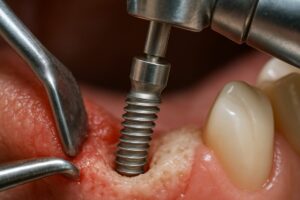Dental implants are replacement tooth roots made from biocompatible materials that anchor a crown, bridge, or denture. The advantages of dental implants are many: they restore chewing, speech, and appearance while protecting oral health. This article explains the benefits, who should consider implants, what to expect during treatment, risks and care, and why seeing a board-certified periodontist matters.
Top advantages of dental implants
Look, feel, and function like natural teeth
Dental implants mimic natural teeth in shape and strength. Crowns attached to implants match surrounding teeth for a seamless look. Because implants are fixed in the bone, they restore chewing power and help you speak clearly without the slipping or clicking common with removable dentures.
Preserve jawbone and oral health
When a tooth is lost, the jawbone can shrink over time. Implants stimulate bone the same way natural roots do, slowing or stopping bone loss. That bone support also protects neighboring teeth and helps maintain your facial structure, a major long-term health and cosmetic benefit.
Durability and long-term value
Implants are made from durable, biocompatible materials like titanium or ceramic. With good care, many implants last decades. While the up-front cost can be higher than bridges or dentures, implants often cost less over time because they rarely need replacement and reduce the need for additional dental work.
Comfort and confidence
Because implants are fixed and integrate with bone, they feel more comfortable than removable options. You can eat, laugh, and speak without worrying about movement. That stability often leads to big boosts in self-confidence and daily comfort.
Who is a good candidate for implants?
General health and lifestyle factors
Good candidates have healthy gums, enough jawbone to support an implant, and reasonable overall health. Non-smokers or those willing to quit do better. Chronic conditions like diabetes should be controlled before implant treatment. Your provider will evaluate medical history and oral health to decide if implants are right for you.
When additional procedures are needed
Some patients need bone grafts or sinus lifts to create enough support for implants. Gum disease must be treated first. These steps add time but make implant placement predictable and safe.
Alternatives and when they make sense
Bridges or dentures can be faster and less costly up front. Bridges may suit people with adjacent healthy teeth, while dentures are an option for extensive tooth loss. Implants are preferred when longevity, bone preservation, and natural function are priorities.
What to expect during the implant process
Consultation and planning
Planning includes imaging like CBCT scans and a personalized treatment plan. Digital workflows help map implant position and final restoration for the best fit and esthetics.
Surgery, healing, and final restoration
Surgery places the implant in the bone. Over weeks to months, osseointegration lets the implant fuse with bone. Once healed, the final crown or bridge is attached. Timelines vary by case, but many patients complete treatment in a few months.
Risks, care, and cost considerations
Possible risks and how specialists minimize them
Complications can include infection or implant failure, but experienced clinicians reduce risk with careful planning, sterile technique, and advanced imaging.
Aftercare and maintenance
Daily brushing, flossing, and regular dental checkups keep implants healthy. Avoiding tobacco and managing health conditions also prolong implant life.
Cost vs. long-term benefits
Financing can help spread costs. Over time, the advantages of dental implants in The Woodlands, TX—less ongoing maintenance and fewer replacements—often make them a smart investment compared with removable options.
Why choose a board-certified periodontist for implants?
Board-certified periodontists have advanced surgical training and experience managing complex cases, increasing predictability and safety. Their expertise helps ensure the advantages of dental implants are realized with fewer complications.
About Dental Specialists & Implant Center and Dr. Adriana Wells
At Dental Specialists & Implant Center in The Woodlands, TX, board-certified periodontist Dr. Adriana Wells provides evidence-based implant care using CBCT imaging, dental lasers, an in-house lab, and biocompatible ceramic implants. The practice blends advanced technology with a spa-like, patient-centered approach to make treatment safe, comfortable, and effective.
Next steps / Call to action
If you’re curious how the advantages of dental implants in The Woodlands, TX could work for you, schedule a consultation. Bring your medical history and any recent dental imaging. A specialist can explain options and create a plan tailored to your needs.




